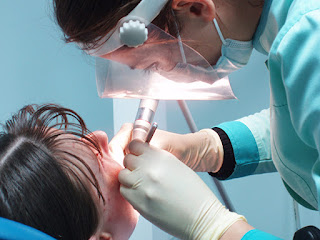As a sedation dentist, we make it possible for people to get dental work done that have been unable to visit the dentist. For a number of Americans, sedation dentistry, is the answer to a life-long fear of the dentist chair. Studies have shown that somewhere between 5% and 8% of Americans have never visited the dentist because they are afraid of the experience. There is no doubt that the fear is a legitimate one, and there are a number of theories why people are so afraid of oral procedures. One theory, that makes a lot of sense, is the helplessness many people feel while in the chair. Having a person hovering over you, with your mouth open to the point of being barely able to speak, can cause a great deal of anxiety for some people.
Luckily sedation dentistry has a solution to help ease some of the anxiety. By allowing our patients to select the level of sedation they want, we can provide them with an experience that is stress-free and still gets the dental work they need to be done. It is inaccurate to refer to sedation dentistry as “sleep dentistry”, a term that is relatively popular, because it is only in some cases that the patient is actually asleep. Much of the time the sedation is at the minimal levels, which allows us to take the edge off and ensure that you are comfortable.
You will need to make a number of decisions with regard to the level of sedation, you want, and need, and also the method of delivery. We will then advise you on the benefits and risks of each of the options, so that you have a complete understanding of sedation and how it works with dentistry. There are four levels of sedation that you can elect for. We will give advice and recommendations for each of these in conjunction with the procedure you are going to be getting.
Mild sedation is the most moderate form of sedation, typically administered using inhalation. A mask is placed over your nose and mouth, following which you will be asked to breathe normally. A solution of nitrous oxide, also known as laughing gas, will be administered. Nitrous oxide causes you to relax and let go of excess anxiety during the procedure.
Moderate or conscious sedation is typically given using a pill. The sedation dentist can determine what level of sedation, you require, and work with an anesthesiologist to get you a pill that has the right level of anesthesia. Typically this kind of sedation does leave you with a heavy tongue and slightly drowsy.
Deep sedation sits somewhere between moderate sedation and full general anesthesia. Deep sedation puts you into a light sleep, from which you could easily be awakened. This allows you to be relatively unaware of the activity around you as we perform the oral work you need.
General anesthesia is the heaviest form of sedation and is typically associated with surgical procedures. Given through an IV, general anesthesia is monitored throughout the surgery and the levels can be adjusted constantly to ensure that patients remain asleep and comfortable.
If you want to learn more about the ways we can help you to relax, schedule an appointment at our sedation dentist office.
Wednesday, February 24, 2016
Monday, February 1, 2016
Questions You Should Ask Yourself Before a Cosmetic Dentistry Appointment
Cosmetic dentistry is an excellent way to improve your smile, transforming imperfections into beautiful teeth. With so many treatment options and a world of possibilities it is important to narrow down what your goals and objectives are before meeting with the dentist. This will ensure that you can clearly articulate what you want to accomplish.
When scheduling an appointment with our office, we recommend that you have your teeth cleaned and examined at the same time. This way we can help to keep your teeth healthy and be sure that there are no lingering health issues that need to be addressed prior to starting any cosmetic work. Once the examination is complete, pull out your list of notes and let us know what you don’t like about your smile.
Before your appointment consider the following:
How much time do you have available? Any type of dental work comes with a time commitment. Whether it is one appointment or five, we need to know how much time you have available along with if you are on a deadline. For example, if you are getting married in six months we will want to know about it so that all of your treatments can be scheduled accordingly. This may influence which treatments we recommend. Simultaneously, if it is hard for you to take time off of work we will want to know so that we can look for appointment times that would work for you and allow for recovery over the weekend. There is no right or wrong answer; we just need the information to plan accordingly.
How white do you want your teeth? It is important for you to feel comfortable with your teeth. In our cosmetic dentistry office, we need to know how white you want your teeth to get. Whether completing a teeth whitening procedure or applying dental veneers or crowns, we need to know the shade you are comfortable with so that they can be created accordingly.
What don’t you like about your smile? Come with a list of the things that you would improve if you could. This should be as specific as possible so that we can be sure to address each issue. For example, “I don’t like my smile” makes it difficult to provide treatment recommendations. On the other hand, “I don’t like the gaps in between my teeth or their color” is easy to understand and to identify treatment solutions. We can easily see what issues are preventing your smile from looking perfect, but it is unnecessary to treat something that isn’t bothering you.
Do you like the appearance of your gums? Many people suffer from a gummy smile where too much of their gum tissue shows for comfort. Others struggle with a receding gum line. We can help you with both problems and need to know how you feel about your gums.
Our cosmetic dentistry office has a plethora of options for treating your teeth and correcting any imperfections in your smile. By coming prepared to discuss what you want, we can make more thorough treatment recommendations.
When scheduling an appointment with our office, we recommend that you have your teeth cleaned and examined at the same time. This way we can help to keep your teeth healthy and be sure that there are no lingering health issues that need to be addressed prior to starting any cosmetic work. Once the examination is complete, pull out your list of notes and let us know what you don’t like about your smile.
Before your appointment consider the following:
How much time do you have available? Any type of dental work comes with a time commitment. Whether it is one appointment or five, we need to know how much time you have available along with if you are on a deadline. For example, if you are getting married in six months we will want to know about it so that all of your treatments can be scheduled accordingly. This may influence which treatments we recommend. Simultaneously, if it is hard for you to take time off of work we will want to know so that we can look for appointment times that would work for you and allow for recovery over the weekend. There is no right or wrong answer; we just need the information to plan accordingly.
How white do you want your teeth? It is important for you to feel comfortable with your teeth. In our cosmetic dentistry office, we need to know how white you want your teeth to get. Whether completing a teeth whitening procedure or applying dental veneers or crowns, we need to know the shade you are comfortable with so that they can be created accordingly.
What don’t you like about your smile? Come with a list of the things that you would improve if you could. This should be as specific as possible so that we can be sure to address each issue. For example, “I don’t like my smile” makes it difficult to provide treatment recommendations. On the other hand, “I don’t like the gaps in between my teeth or their color” is easy to understand and to identify treatment solutions. We can easily see what issues are preventing your smile from looking perfect, but it is unnecessary to treat something that isn’t bothering you.
Do you like the appearance of your gums? Many people suffer from a gummy smile where too much of their gum tissue shows for comfort. Others struggle with a receding gum line. We can help you with both problems and need to know how you feel about your gums.
Our cosmetic dentistry office has a plethora of options for treating your teeth and correcting any imperfections in your smile. By coming prepared to discuss what you want, we can make more thorough treatment recommendations.
Labels:
Cosmetic Dentistry
Subscribe to:
Posts (Atom)

